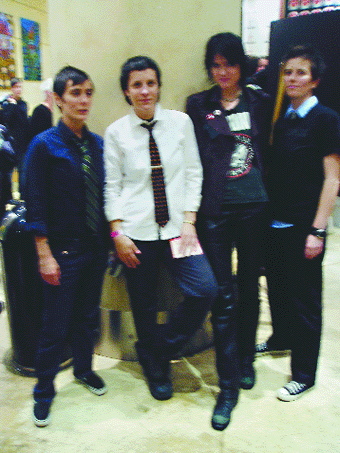“Homophonic” gathers queer artists for Virgin mega-performance
“It shouldn’t be a badge,” huffed Justin Tranter, an emerging musician out of breath after jumping while he screamed and growled into the microphone on stage in a corner of the cavernous Union Square Virgin Mega-store. His right eye smeared with pink makeup, the same color of the ragged pink shirttail falling short of his navel, revealing tight Calvin Klein underwear, Tranter looked out over the hundred or so cheering fans and proclaimed, “We shouldn’t be labeled gay artists, and it shouldn’t be a selling point for our music. Why can’t we just be songwriters who happen to be gay?”
Folk singer Eric Himan and all-girl punk band Triple Crème joined Tranter to sing, yell and shout their music for an adoring and supportive audience gathered for the Planetout.com-sponsored event, cleverly dubbed “Homophonic.” Bob Mould, the highly revered godfather of grunge and openly gay musician, the show’s host, introduced the musicians, and waxed nostalgic with some longtime fans.
“It’s wonderful to see so many people ‘out’ so young and integrated,” Mould commented. Former front-man of 80s grunge bands, Husker Du and Sugar, Mould continued with a few brief comments about coming out late in his career before introducing Himan, the first performer.
Himan wooed the crowd with crystalline vocals and wholesome solo acoustic guitar playing. He expressed his sensibility with a delicate song called “It’s My Decision” that he wrote in college about sexual assault. “Is it a keeper?” he asked the audience. They cheered. He plays a lot of college crowds, but doesn’t limit himself to any sort of venue or audience. “You decide if you get typecast for a certain type of setting,” he said, talking to his friends after his performance. “Play everywhere—anywhere people will listen.”
Mould took the stage again to note the difference between music written by gay and straight artists, without furnishing details, the next band standing ready to play.
Triple Creme plays heavy punk, crunching solid, powerful sounds through their heavily distorted amplifiers. Interestingly, two of them use Rickenbacker guitars, which are 1960s relics popularized by the Beatles and other British pop icons, while another plays a Gibson SG, hard rockers’ more typical tool. It’s enthralling to see a short woman with jet-black, spiked short hair, chugging as hard as she can on the same sort of guitar Lennon gently strummed as he enticed thousands of young ladies. The band likes to “combine different elements and mix sounds” to express their music, which they identify as “queercore.” Queercore, according to Queercoreblitz.com is a sub-genre of punk originally spawned out of the politically explosive environment of the Reagan years. Lyrically, and in performance, queercore rawly and honestly addresses queer desire, societal prejudice and the price of being true to one’s own self.
Doesn’t this sound like a label? Maybe, but it’s not meant to limit expression.
“Our music is only ‘queer’ because as queers we are creating it and drawing from personal experience,” said Robin Pickering, Triple Creme guitarist and singer. “However, personal experience very often crosses over into the universal and that concept doesn’t seem to be widely recognized yet in the industry. Ultimately, being queer should neither enhance our status nor limit us in terms of being heard and appreciated as musicians. Queer is who we are as people and our music should be accessible for whoever wants to hear it, not just the queer audience.”
Their music, indeed, is beginning to filter into a larger group of listeners as venues like Southpaw in Brooklyn attract performers of all genders and sexualities. However, this also raises the question, is being a queer getting trendy? With the Fab Five on “Queer Eye for the Straight Guy,” “Will and Grace” and even reality TV’s “Boy Meets Boy,” is gayness the newest pop culture flavor of the month?
“Yeah, MTV music video has had major influence over music, making it about image, but fads will come and go and we will stay who we are,” said Terry LaFrazia, Triple Creme’s bassist. “We’ll still be queer in a few years when the craze has moved on to the next hot thing.”
Justin Tranter shares that philosophy. “TV shows have popularized gay styles and made it sort of a fad to be gay. We can’t use that to sell ourselves, we’re not clowns,” he said as he fiddled with his pink purse and slung a mink fur over his shoulder. When prodded about how he reconciles as not being viewed as a parody of flamboyance, Tranter replied, “It’s just who I am. I wear this everyday. I wear makeup everyday. In the beginning of all minority movements, the artists need to unite, but then, as the movement grows, they need to separate and become their own artists.”
All three artists shared one viewpoint, a viewpoint Mould expressed well at the after-party when he said, “Back in the day there were a lot of homos, but no one cared. But now it’s big to be out, its great to see these artists just being themselves, just playing their music and not selling their identity.”


































